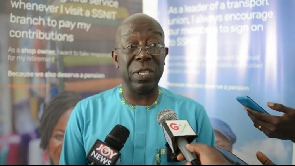The Director General of Social Security and National Insurance Trust (SSNIT) has disclosed that the majority of Ghanaian workers are presently not on Social Security and National Insurance Trust (SSNIT) According to him, just a paltry two million of the Ghanaian workforce, out of ten million workforce, are currently on the SSNIT pension scheme. Dr. Ofori Tenkorang disclosed this when he interacted with journalists this week on the sideline of a breakfast meeting with employers, organized by SSNIT in Takoradi in the Western Region. "Statistics that we put out there, supported by the Ghana Statistical Service (GSS) says, that there are about maybe some ten million (10m) workers in Ghana. And when we look at the people that are contributing to SSNIT, there is some two odd million (2m). That means that there are about eight million (8m) people who do not contribute to SSNIT to insure the incomes that they are earning. "And we know they are working and some of them are making more money than you and I combined" Dr. Ofori Tenkorang revealed. He expressed regret that many private sector employers have turned a blind eye to the operations of the scheme and have refused to see the benefits of the pension scheme, hence the lackluster attitude being shown to SSNIT. "They haven't taken advantage of the SSNIT scheme, partly because maybe the law doesn't make it mandatory for them to. But, they also deserve a pension just like the people that sit in offices," he advised. Explaining the significance of the scheme, he pointed out that "The SSNIT scheme is very generous". He observed that many private companies have rather resorted to unconventional methods of securing the future with informal activities. "They appear to all rely on 'susu' and maybe some tier three products which are defined contributions." Whilst agreeing with employers and Ghanaian workers who maybe having genuine reasons for opting for alternative services, he charged them nonetheless to consider the cost involved against the offer being presented to them by SSNIT. "The SSNIT scheme actually is only partially funding, meaning that the insured doesn't have to fully fund their pension," he added.
Regional News of Friday, 21 October 2022
Source: Zambaga Rufai Saminu













